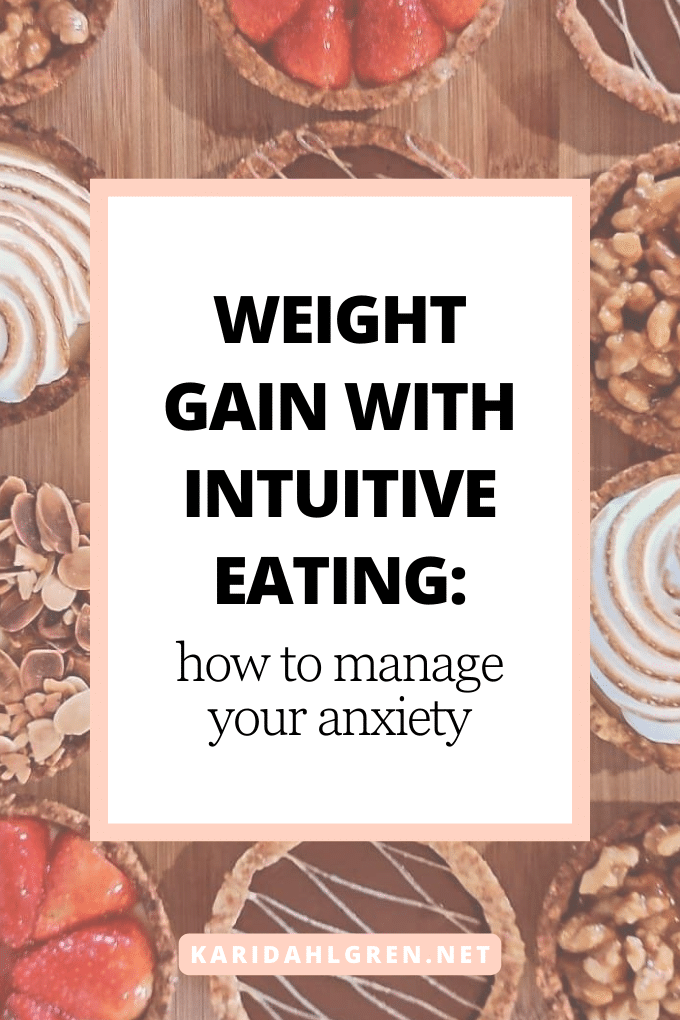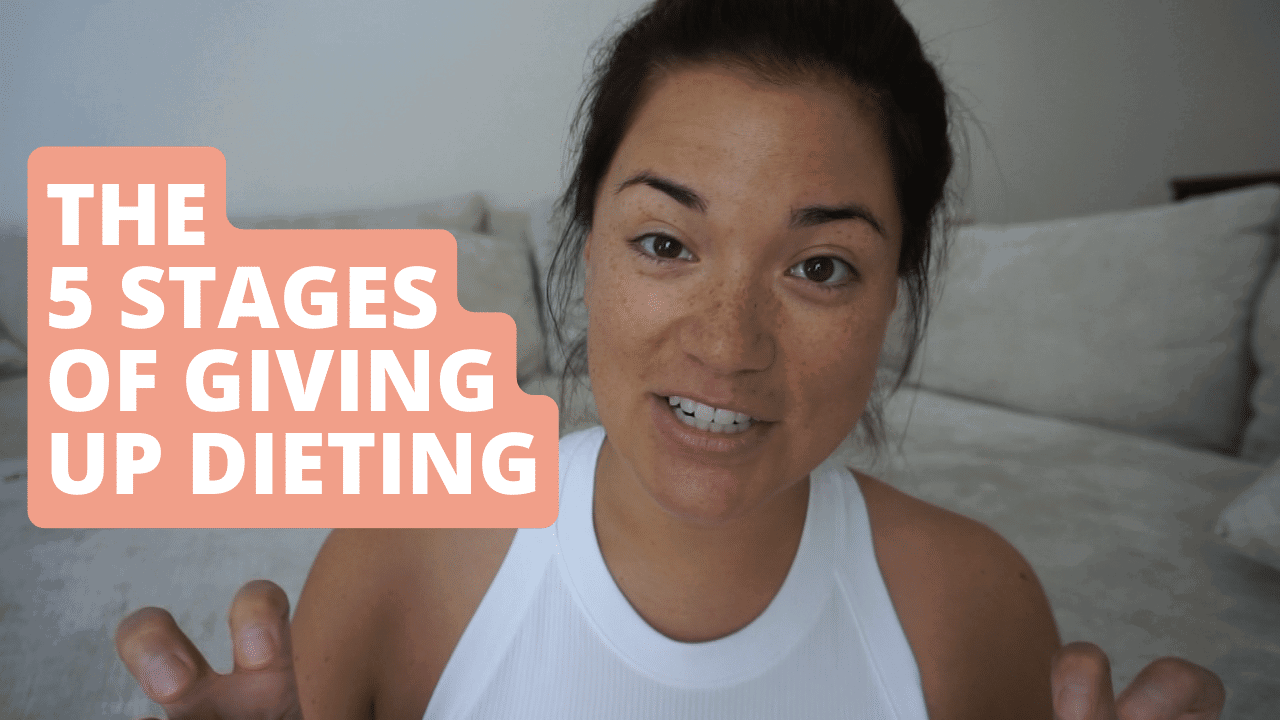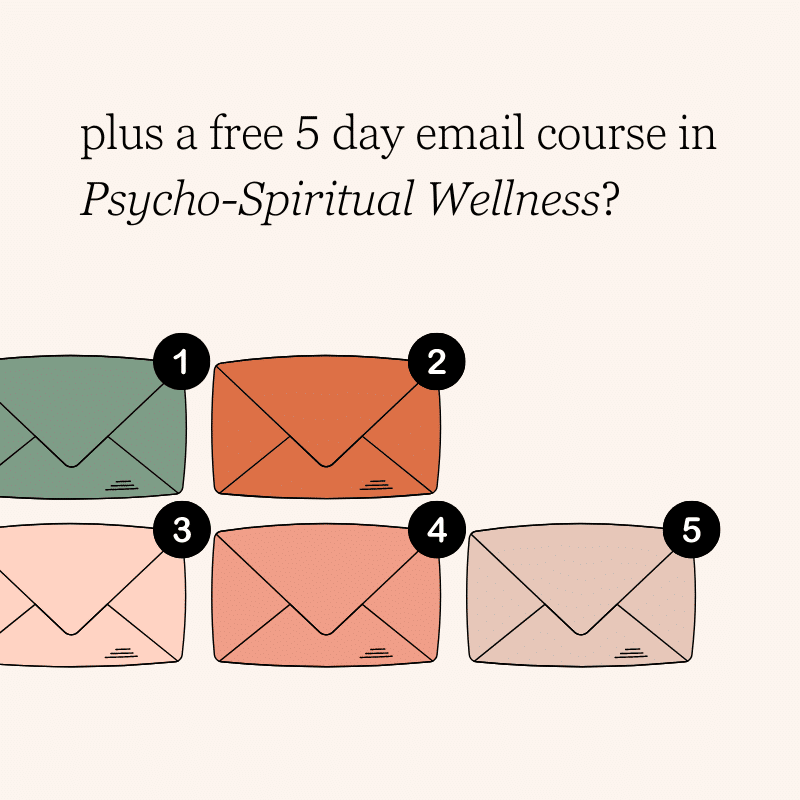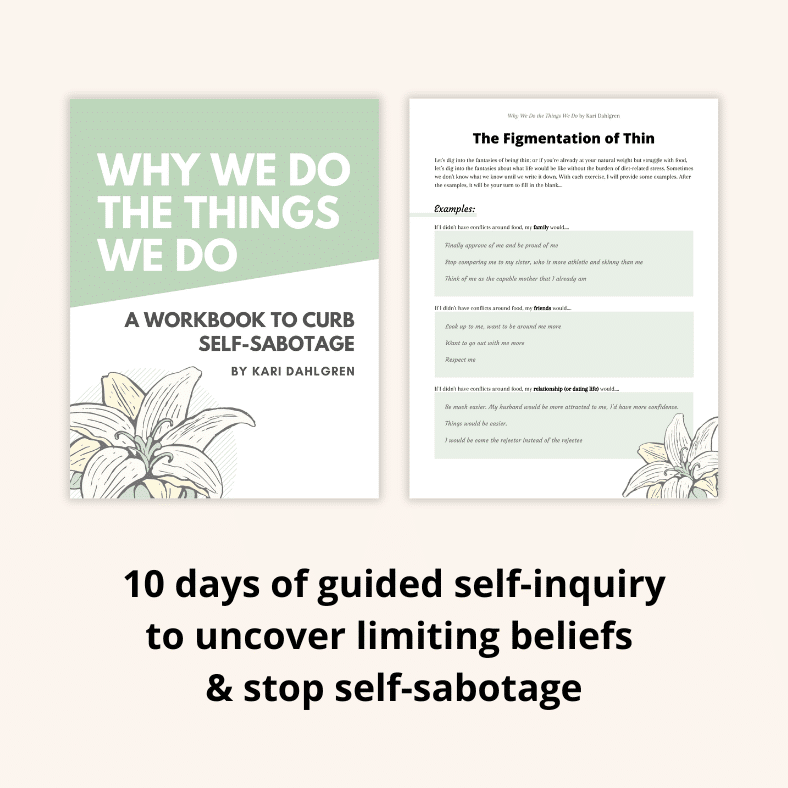
Do you like the idea of giving up dieting and listening to your body instead, but struggle with anxiety around the possibility of weight gain with intuitive eating?
This anxiety is common and deserves immense self-compassion as you work through this fear. In a culture obsessed with dieting and thin ideals, embracing intuitive eating can feel like rebellion, which can heighten the fear of weight gain or perceptions of personal failure.
As an eating psychology coach, I’ve witnessed many people transition from dieting to intuitive eating — individuals who once shared the same concerns about weight gain. Through our shared experiences of giving up dieting, I hope to offer you valuable perspectives to help you prepare for what’s ahead.
You’re about to discover what clinical studies reveal about intuitive eating and its impact on weight management. You’ll also find practical advice to help you navigate this worry with greater confidence.
Intuitive Eating & Trusting Your Body
Before we talk about intuitive eating weight gain, let’s get a clear understanding of some basic intuitive eating principles. Intuitive eating is an empowering approach to nutrition that encourages you to listen to your body and trust your body’s hunger and fullness signals. It’s about giving yourself permission to eat what feels right for your body, without guilt or restriction.
One aspect that helps alleviate feelings of guilt around food is the concept of food neutrality, where all foods are seen as equal, removing the labels of ‘good’ or ‘bad.’ Other key principles of intuitive eating include honoring your hunger, respecting your fullness, and discovering the satisfaction factor in eating.
Intuitive eating also offers a refreshing perspective on weight, shifting the focus away from dieting and weight control to overall well-being. It advocates for body acceptance and challenges the societal obsession with thinness. However, for some people it can be difficult to break away from diet culture, causing anxiety and fear around the possibility of intuitive eating weight gain.
Will Intuitive Eating Cause Weight Gain? Show Me the Science

Some people in the intuitive eating sphere share that it’s common for people to gain weight initially with intuitive eating. However, in my personal experience through both my own journey giving up dieting and watching clients and readers do the same, I haven’t actually witnessed this pattern. Instead of looking at personal stories, let’s turn to clinical evidence.
On one hand, studies show that intuitive eating leads to greater weight stability than dieting.[1], [2] The good news doesn’t stop there. Intuitive eaters also have better body satisfaction, improved psychological health, enhanced metabolic fitness, and better eating habits than dieters.[3], [4]
Some people wonder if intuitive eating is healthy, and the evidence is clear: there are many health benefits of eating according to your body’s signals. In regards to weight gain specifically, there is clinical evidence that can help paint a picture of what to expect, and it’s actually a concept central to intuitive eating: set point weight theory.
Set Point Weight Theory: What Causes Weight Gain and Loss?
Strong clinical evidence shows that the body will rigorously defend a “set point weight” or a series of “settling points” through biological adaptations in response to food intake.[5], [6] While there are many factors involved in set point weight theory, the concepts most relevant to the fear of weight gain with intuitive eating involve metabolism.
When someone increases their food intake, such as during periods of overeating, the body naturally ramps up metabolism to compensate for this increase in energy.[7] In a similar fashion, when someone decreases their food intake, such as with a restrictive diet, the body naturally slows metabolism to compensate, reducing the potential for weight loss.[8]
This series of biological adaptations to restriction are one reason why dieting often leads to long-term weight gain, not weight loss.[9] This might beg the question: “If my body compensates for overeating by ramping up metabolism, then why have I gained weight from overeating in the past?”
The answer could be related to dieting efforts. When someone responds to overeating by undereating (which is not recommended!), it can actually prompt the body to increase its set point weight, undermining the body’s natural ability to regulate itself.[10], [11]
Can You Avoid Weight Gain with Intuitive Eating?
There are many good reasons to give intuitive eating a try. Weight loss isn’t one of them — but it also doesn’t mean that people should be shamed for desiring weight loss with intuitive eating. I personally advocate for at least some initial acceptance for the drive for thinness — even though it’s not ideal — because it takes time to unravel. Even if someone really wants to let go of the desire to be thin, it’s not a simple step, nor is it easy for everyone.

When (some, but not all!) anti-diet dietitians shame people for wanting to lose weight while eating intuitively, it only adds to the preexisting shame of being overweight, which heightens self-criticism. Compulsive eaters don’t need any more self-criticism on their plate. Furthermore, intuitive eating naturally leads to a reduced drive for thinness in the long-run.[1-4]
The more someone experiences failure with dieting — not because of personal error but because of the body’s biological adaptation to restriction — the more it trains the brain to fixate on personal failure; which may ramp up self-criticism and a drive for thinness.
However, when someone gives up dieting, it reduces the mental rehearsal of self-criticism and naturally leads to a place where self-compassion can emerge — and a reduced drive for thinness is often the result of enhanced self-compassion.
How to Address Fears of Intuitive Eating Weight Gain
There’s no way to know what will happen to your weight once you start eating intuitively. However, I can offer numerous insights and guidance for managing anxiety related to the fear of weight gain with intuitive eating.
Here are some steps to help reduce anxiety around the possibility of weight gain with intuitive eating:
1. Consider Any Recent Diet-Induced Weight Loss
According to set point weight theory, people who lose weight through dietary restriction are likely to regain weight. Clinical studies have found that dieters tend to regain at least one-third to two-thirds of weight lost within a year and almost all weight is regained within 5 years.[12]
To generally assess the chances of intuitive eating weight gain, look at any weight lost through restrictive dieting in the last year or even the last 5 years. If you recently went on a diet and successfully lost weight, you are more likely to gain weight — not because of intuitive eating, but because your body was already primed to gravitate back to its initial set point weight.
2. Be Ready for Anything
What if you haven’t recently lost any weight through restrictive dieting? Does that mean you won’t gain weight with intuitive eating? These questions are impossible to answer because every person is unique, and no one can guess how your body will react or adapt to intuitive eating.
Instead of trying to find sure footing by knowing precisely whether intuitive eating will lead to weight gain or weight loss, acknowledge that you’re looking for certainty in an uncertain area. Give yourself compassion for this normal human tendency, and then make peace with uncertainty. Let yourself be ready for anything, knowing that the long-term benefits of intuitive eating are worth it.
3. Focus on Emotional Skill-Building to Stop Emotional Eating
Now that you know the importance of embracing any outcome, let’s talk about one “sure thing” you can do to maximize your chances of stopping compulsive eating: focusing on emotional skill-building — specifically emotional awareness and emotional tolerance.
Studies show a strong link between low tolerance for distress and overeating.[13] If you have a low tolerance for negative emotions such as stress or sadness and it often triggers emotional eating, that won’t go away once you start eating intuitively. You may end up overeating and gaining weight — not because of intuitive eating, but because emotional eating has not yet been addressed.
To help with this, focus on gaining awareness around the emotions that trigger the desire to eat without hunger and develop tolerance for those uncomfortable feelings. My Stop, Drop, & Feel technique is designed to help with this.
In a nutshell, it asks you to drop into your emotions in the precise moment that you want to overeat and make space for discomfort — kind of like urge surfing. When practiced daily, this helps build emotional awareness and emotional tolerance. Of course, this is the simplified version, and it’s worth exploring in depth because the intuitive eating sphere generally overlooks this important area.
4. Know the Stages of Giving Up Dieting
By now, you’re fully aware that any attempt to understand intuitive eating weight gain is driven by the desire for certainty in an uncertain situation. Fortunately, there is one area that can help you anticipate at least a little of what’s to come once you give up dieting: the stages of giving up dieting.

Once you give up the food rules and embrace intuitive eating, there are a series of stages that you may go through — one of which is the ‘rebellion’ phase. As you lift the food restrictions, some people may feel compelled to indulge in previously forbidden foods in a rebellious way — and rightfully so after years or even decades of deprivation. The good news is that with sufficient emotional tolerance under your belt, you can reduce the chances of indulgence turning into overindulgence.
Also, keep in mind that the ‘rebellion’ phase is a rite of passage that everyone goes through. In my practice, I have not observed anyone that was able to skip this phase, but I’ve also noticed that not everyone experiences weight gain during this stage. There are many factors that play into this, and I believe one of them is emotional tolerance. When someone gives up dieting, their experience tends to be more positive if they are already prepared to manage emotional eating.
5. Start Intuitive Eating When You’re Ready
The timeline for embracing intuitive eating is different for everyone. There’s no one-size-fits-all approach, and what works for one person may not work for another. Some individuals might feel prepared to dive headfirst into this new way of relating to food, eagerly embracing the principles of intuitive eating from the get-go.
If you’re afraid of intuitive eating weight gain, and this fear feels overwhelming, it might be a good idea to refrain from giving up the food rules right away and instead focus your effort on emotional skill-building. Diving into intuitive eating before you’re ready and without an appropriate support system can lead to a bumpy ride and discourage you from sticking with it.
Making Peace with Uncertainty
Embracing intuitive eating is not about achieving a certain weight, but about fostering a healthier relationship with food and your body. If you’re new to intuitive eating, learning how to trust your body can be both challenging and greatly rewarding.
While the fear of weight gain is a common concern with intuitive eating, it’s important to remember that weight is not the focus — it’s about healing your relationship with food. By focusing on emotional skill-building and preparing for the stages of giving up dieting, you can navigate this journey with greater confidence.
- Bacon, Linda et al. “Size acceptance and intuitive eating improve health for obese, female chronic dieters.” Journal of the American Dietetic Association 105,6 (2005): 929-36. doi:10.1016/j.jada.2005.03.011
- Hazzard, Vivienne M et al. “Intuitive eating longitudinally predicts better psychological health and lower use of disordered eating behaviors: findings from EAT 2010-2018.” Eating and weight disorders : EWD 26,1 (2021): 287-294. doi:10.1007/s40519-020-00852-4
- Schaefer, Julie T, and Amy B Magnuson. “A review of interventions that promote eating by internal cues.” Journal of the Academy of Nutrition and Dietetics 114,5 (2014): 734-60. doi:10.1016/j.jand.2013.12.024
- Wilson, Rebecca E et al. “Brief non-dieting intervention increases intuitive eating and reduces dieting intention, body image dissatisfaction, and anti-fat attitudes: A randomized controlled trial.” Appetite 148 (2020): 104556. doi:10.1016/j.appet.2019.104556
- Ganipisetti VM, Bollimunta P. Obesity and Set-Point Theory. [Updated 2023 Apr 25]. In: StatPearls [Internet]. Treasure Island (FL): StatPearls Publishing; 2024 Jan-. Available from: https://www.ncbi.nlm.nih.gov/books/NBK592402/
- Müller, Manfred J et al. “Is there evidence for a set point that regulates human body weight?.” F1000 medicine reports 2 59. 9 Aug. 2010, doi:10.3410/M2-59
- Jéquier, E, and L Tappy. “Regulation of body weight in humans.” Physiological reviews 79,2 (1999): 451-80. doi:10.1152/physrev.1999.79.2.451
- Johannsen, Darcy L et al. “Metabolic slowing with massive weight loss despite preservation of fat-free mass.” The Journal of clinical endocrinology and metabolism 97,7 (2012): 2489-96. doi:10.1210/jc.2012-1444
- Maclean, Paul S et al. “Biology’s response to dieting: the impetus for weight regain.” American journal of physiology. Regulatory, integrative and comparative physiology 301,3 (2011): R581-600. doi:10.1152/ajpregu.00755.2010
- French, S A et al. “Predictors of weight change over two years among a population of working adults: the Healthy Worker Project.” International journal of obesity and related metabolic disorders : journal of the International Association for the Study of Obesity 18,3 (1994): 145-54.
- Korkeila, M et al. “Weight-loss attempts and risk of major weight gain: a prospective study in Finnish adults.” The American journal of clinical nutrition 70,6 (1999): 965-75. doi:10.1093/ajcn/70.6.965
- Dulloo, A G, and J-P Montani. “Pathways from dieting to weight regain, to obesity and to the metabolic syndrome: an overview.” Obesity reviews : an official journal of the International Association for the Study of Obesity 16 Suppl 1 (2015): 1-6. doi:10.1111/obr.12250
- Kozak, Andrea T et al. “Are overeating and food addiction related to distress tolerance? An examination of residents with obesity from a U.S. metropolitan area.” Obesity research & clinical practice 11,3 (2017): 287-298. doi:10.1016/j.orcp.2016.09.010


![best seller [cover of Why We Do the Things We Do]](https://karidahlgren-net.b-cdn.net/wp-content/uploads/2023/09/why-we-do-the-things-we-do-1.png)
